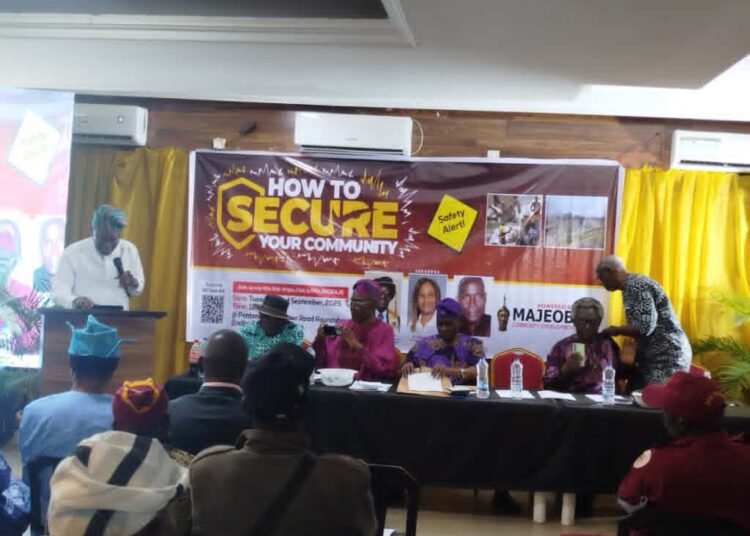In response to rising concerns over insecurity and threats to community well-being across Yorubaland, the Majeobaje Community Development Initiative convened a conference aimed at empowering residents with practical strategies to safeguard their neighborhoods.
The event, titled “How to Secure Your Community,” brought together traditional leaders, civil society actors, security experts, and grassroots stakeholders for a frank dialogue on local solutions to the ongoing security crisis.
Chief Akintayo Akin-Deko, a prominent voice in the Majeobaje Initiative, delivered the keynote address, stressing the irreplaceable role of neighbors and local networks in responding swiftly to emergencies.
“It is the help that your neighbor or community renders at the time of an emergency that will likely determine your chances of survival,” Chief Akin-Deko stated. “They are your true first responders.”
While acknowledging the bravery and commitment of official security forces, including the Police, Amotekun Corps, Civil Defence, and the Nigerian Military, he noted that these institutions often face significant logistical constraints such as fuel shortages, delayed communication, and understaffing.
“Our brave men in uniform are actually second responders,” he continued. “By the time they arrive sometimes hindered by terrain or lack of fuel, the emergency may have already escalated into a deadly crisis.”
Dr. Seye Oyeleye, another speaker at the event, lauded the timing and relevance of the meeting, urging communities to embrace a culture of proactive vigilance and collective responsibility.
“Vigilance and security consciousness are what brought us here today,” he said. “This meeting is a meaningful step in the right direction, and it is essential that communities become more deliberate and united in addressing security concerns.”
He encouraged residents to build local safety networks, improve communication between neighborhoods, and maintain strong ties with local law enforcement and traditional institutions.
Security expert and academic Prof. Femi Olufunmilade offered a sobering analysis of worsening insecurity in rural parts of Yorubaland. He warned that a growing influx of migrants, including herders, has exacerbated land use conflicts, triggered food insecurity, and sparked violent clashes in farming regions.
“Many communities in Yewa, Ibarapa, and Oke-Ogun are under siege,” he said. “We are seeing the displacement of farmers, the destruction of livelihoods, and the loss of innocent lives.”
Prof. Olufunmilade traced these challenges to deeper structural issues, including mass unemployment, entrenched poverty, weak state institutions, and the erosion of trust in the justice system. He emphasized the need for long-term policy reforms that address the root causes of insecurity, not just the symptoms.
Adding a cultural and political dimension to the discussion, Dr. Bukola Adeniji, Secretary-General of the advocacy group Think Yoruba First, made a compelling case for ethnolinguistic federalism as a strategic solution to the erosion of Yoruba identity and security.
“Restructuring Nigeria along ethnolinguistic lines would allow each group to maintain greater control over its language, culture, and governance,” Dr. Adeniji argued. “Only then can Yoruba heritage be fully protected from marginalization and gradual erasure.”
She highlighted that such a federal structure would empower local communities to create security systems, educational policies, and cultural protections tailored to their unique heritage and social realities.
Brigadier-General Kunle Togun (Rtd) brought a military veteran’s perspective to the discussion, emphasizing the urgent need for grassroots intelligence gathering, community policing, and inter-community coordination.
Drawing from decades of security experience, General Togun advocated for stronger collaboration between residents and traditional authorities to detect and neutralize threats before they escalate.
“The enemy does not always come with guns; sometimes, it starts with a strange face asking innocent questions,” he warned. “We must train our eyes and ears to see beyond the surface. The safety of our communities lies in our unity and alertness.”
He also stressed that security is not just the responsibility of uniformed agencies but a collective obligation that starts at the household level.
The conference concluded with a renewed sense of purpose and commitment among participants. Community leaders resolved to strengthen neighborhood watch groups, enhance traditional security systems, and advocate for structural reforms that place communities, not just governments at the heart of public safety.
As insecurity continues to threaten lives and livelihoods, the Majeobaje Community Development Initiative reaffirmed its mission: to educate, organize, and empower Yoruba communities to defend themselves, preserve their culture, and build a future rooted in unity and self-determination.












